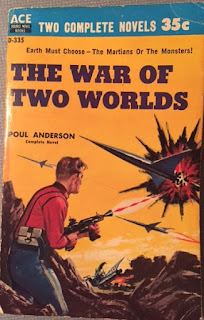a review by Rich Horton
Here's a couple of books from the '90s, so not that old. And I doubt they sold all that well. But they are somewhat fun books by a writer who did some very fine work in the SF field. These are mysteries, however, and it's my sense that they have drifted quite quickly into Forgotten status.
Neal Barrett, Jr. (1929-2014) began publishing SF with stories published more or less simultaneously in the August 1960 issues of Galaxy and Amazing, so he was either (or both) a Gold (and Pohl?) discovery or a Goldsmith discovery. That said, he also worked for the Stratemeyer Syndicate, publishing as by Victor Appleton and Franklin W. Dixon, so presumably he wrote both Tom Swift stories and Hardy Boys stories, though I don't know when. His early work was decent but not particularly special, but in the 80s and through the 90s he published some excellent novels (most notably Through Darkest America) and stories (my favorite being "Stairs"). Later he turned to mysteries of a somewhat gonzo tone, as with these books. He was SFWA Author Emeritus in 2010.
In the '90s he published a number of mysteries. Most of them have titles ending in "Blues". Some of are part of a series about a guy named Wiley Moss. I saw a number of these titles for sale at a remainder shop in Branson, when on vacation. (Which raises the question -- why are mass market paperbacks being remaindered? And are authors getting screwed in the process?) I looked for the earliest one in the pile, which turned out to be Pink Vodka Blues, from 1992.
 |
Pink Vodka Blues is not a Wiley Moss mystery, nor indeed, it would seem from internal evidence, part of any ongoing series at all. The lead character is Russell Murray, a seriously alcoholic writer for a literary magazine in Chicago. He returns from a trip to Dallas for his editor with absolute no memory of where he's been or what he's done. Worse, he wakes up in a hotel room with a naked woman he doesn't recognize -- and minutes later a couple of hitmen smash their way into the room and kill the woman -- the terrified Russell escapes by sheer luck. Naturally enough, he is soon the prime suspect in the murder of the woman, and he is quickly on the run. He still has no idea what happened in Dallas -- he was supposedly delivering a manuscript to a reclusive author while his editor, who was supposed to do the job, spent the weekend with his mistress. Soon Russell learns that his editor is the nephew of a local mob boss, and that two factions in the mob want whatever Russell was supposed to deliver, which delivery apparently never happened. Russell can't help, because his memory is shot. He ends up in a rehab facility after passing out in his car -- and there he meets a beautiful and rich alcoholic woman. When the mob track him down, he and the woman escape, and rather clumsily and drunkenly wind their way across the US, to Dallas, Florida, and back to Chicago, chased by two strange sets of hit people, trying to figure out what Russell has forgotten.
 The book is quite funny at times, though it's also a scary (and accurate-seeming) portrayal of alcoholism. The main characters are nice enough that we root for them, but they are by no means hero and heroine -- they are losers, and if they end up halfway solving their problem, only some of the bad guys get their due, and the good guys only partly get a happy ending also. Which qualifies as fairly realistic, I guess. This fits more or less into the Elmore Leonard end of the crime fiction genre, though I'd call it not as good as Leonard, but worth reading.
The book is quite funny at times, though it's also a scary (and accurate-seeming) portrayal of alcoholism. The main characters are nice enough that we root for them, but they are by no means hero and heroine -- they are losers, and if they end up halfway solving their problem, only some of the bad guys get their due, and the good guys only partly get a happy ending also. Which qualifies as fairly realistic, I guess. This fits more or less into the Elmore Leonard end of the crime fiction genre, though I'd call it not as good as Leonard, but worth reading.I also found the first of his Wiley Moss mysteries, Skinny Annie Blues, from 1996. Wiley Moss is an artist (he draws bugs) in Washington, D. C., living with a beautiful but dotty woman named Giselle. He gets a phone call telling him that his Dad, who left his mother when he was a child, has died down in Galveston, and that he better not come down there. Naturally, he figures something nasty is up, and heads to Texas. Once there, he gets in all kinds of strange trouble, involving at least three more beautiful women: his Dad's new wife, a blind black woman named Grace; a restaurant owner named Annie (not Skinny Annie, though!); and a redhaired woman who takes immediate dislike to him on the plane. Wiley blunders around Galveston, running afoul of the corrupt sheriff R. J., the mobster Pound, the various women, and low rent criminal Harry Sykes. Everybody seems to assume he knows something about the deal his Dad had going before he died. It's all a bit chaotic, and it depends on people acting fairly stupidly. There's a lot of funny stuff, and some wild stuff, but it doesn't really cohere. Minor.








